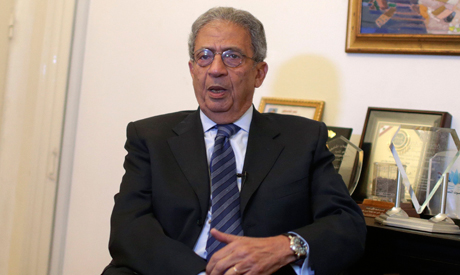
Amr Moussa speaks during an interview with Reuters in Cairo March 11, 2014 (Reuters)
Amr Moussa, Egypt's former high-profile foreign minister, told parliamentary reporters Monday that he does not believe that there is a pressing need to amend the country's constitution.
"To those MPs who are requesting an amendment of the new constitution, I say, I agree with you that Egypt's national charter shouldn't be considered a holy Qu’ran," said Moussa, adding that "at the same time we should agree that this charter and all laws related to it have to be put into full implementation first before we open a debate about amending it."
Moussa, who led the 50-member committee which drafted Egypt's new constitution in January 2014, also argued that "when we discuss the issue of amending the constitution, we should discuss it wisely and rationally."
"Constitutions represent the backbone of nations and when we open them up for discussion, we should not do this for personal interests or for ideological inclinations," said Moussa.
Moussa's words came Monday after meeting with constitutional law professor Ali Abdel-Al to congratulate him on his election as speaker of Egypt's new parliament.
Moussa told reporters "we all were waiting for Egypt to have a new parliament that can implement 2014's new constitution and all laws complementing it."
"Now we have a new parliament [that is] still in year one. As a result, we are still in the early stages of making the new constitution a reality on the ground," said Moussa, concluding that we should "implement the constitution and its related laws fully first and then let us discuss whether any of its articles should be implemented or not."
Moussa said he and speaker Abdel-Al agreed that the new parliament should exercise its new powers granted by the new constitution very seriously and very powerfully.
"We agreed that this parliament was granted adequate legislative and supervisory powers and that it should be given the chance and time to exercise them fully and we all have high hopes about this," said Moussa who also served as the former secretary of the Arab League.
Moussa cited Abdel-Al as saying that after the first two weeks of parliament in session he is highly optimistic that the House will exercise its responsibilities effectively. "This was clear when MPs refused to toe the line of their parliamentary coalitions and rejected the Civil Service Law," said Moussa.
Moussa said he has no objections in the formation of coalitions in parliament. "This should be left for MPs to assess, but they should be clear that parliament is part of the Egyptian state and we all should work together to serve this state," said Moussa.
Egypt's new parliament – the House of Representatives – will convene next Sunday to discuss a report aimed at reforming its internal structures. The report, prepared by a 25-member committee, recommends that the total of parliament's affiliated committees be increased from 19 to 26 to reinforce the legislative and watchdog roles of the House.
It also recommends that the speaker's massive powers be reduced to chairmen of committees and that parliament's internal bureau, which is in charge of running its affairs should be widened to include representatives of political parties. The bureau currently includes the speaker, its two deputies, and parliament's secretary-general only.
Short link: